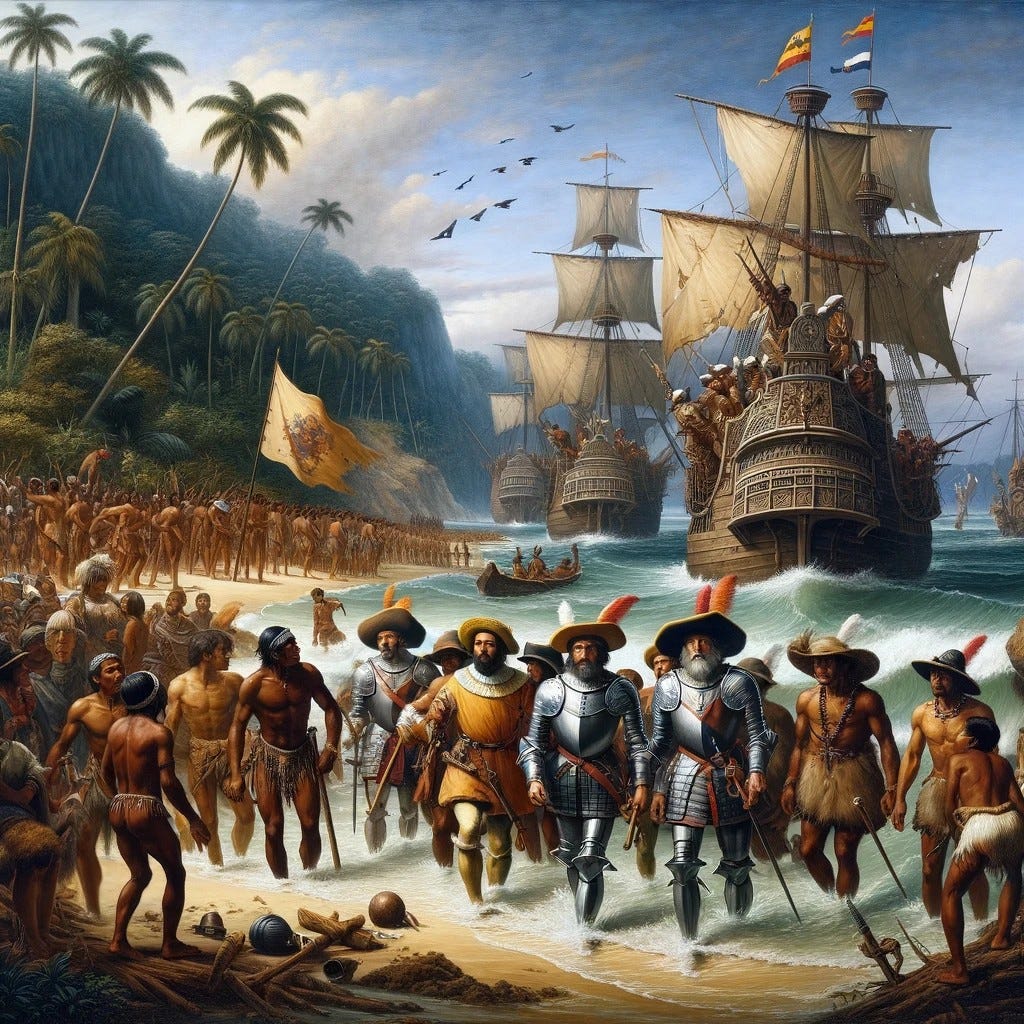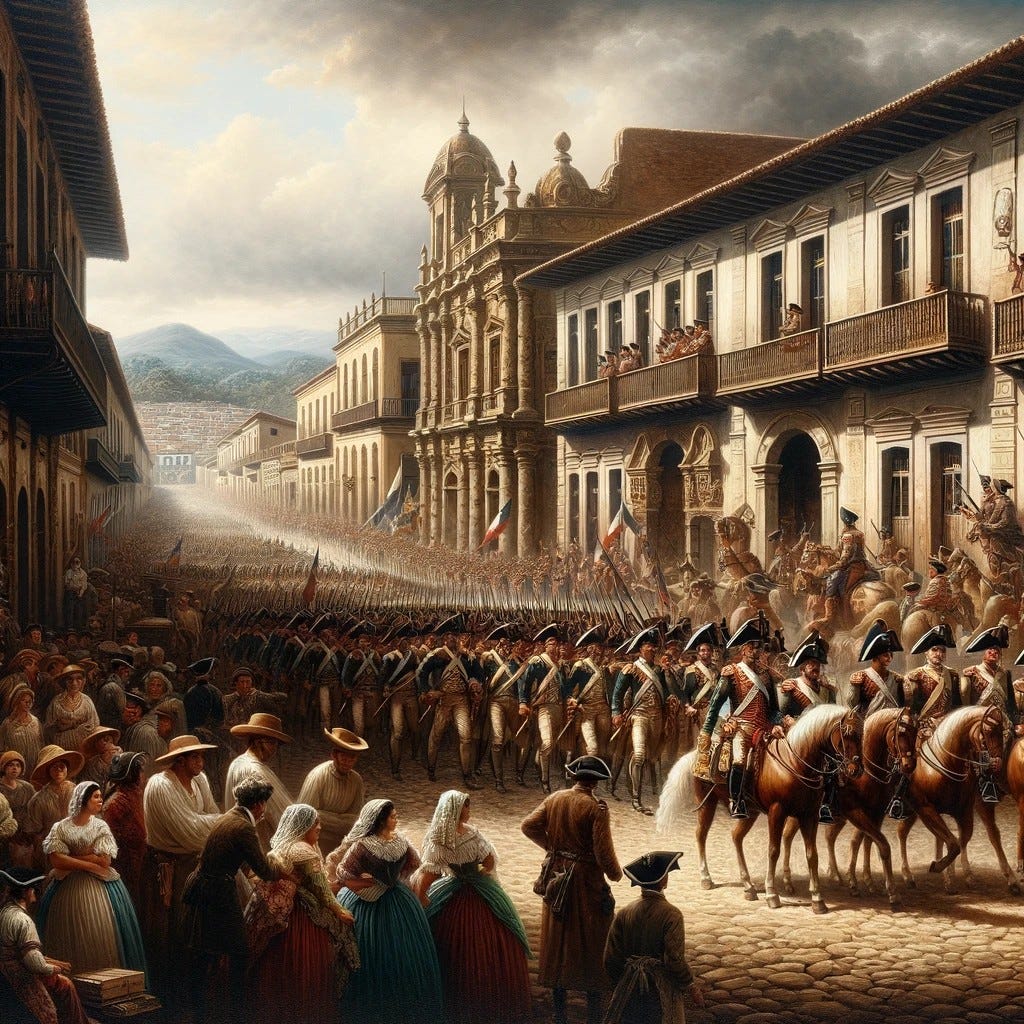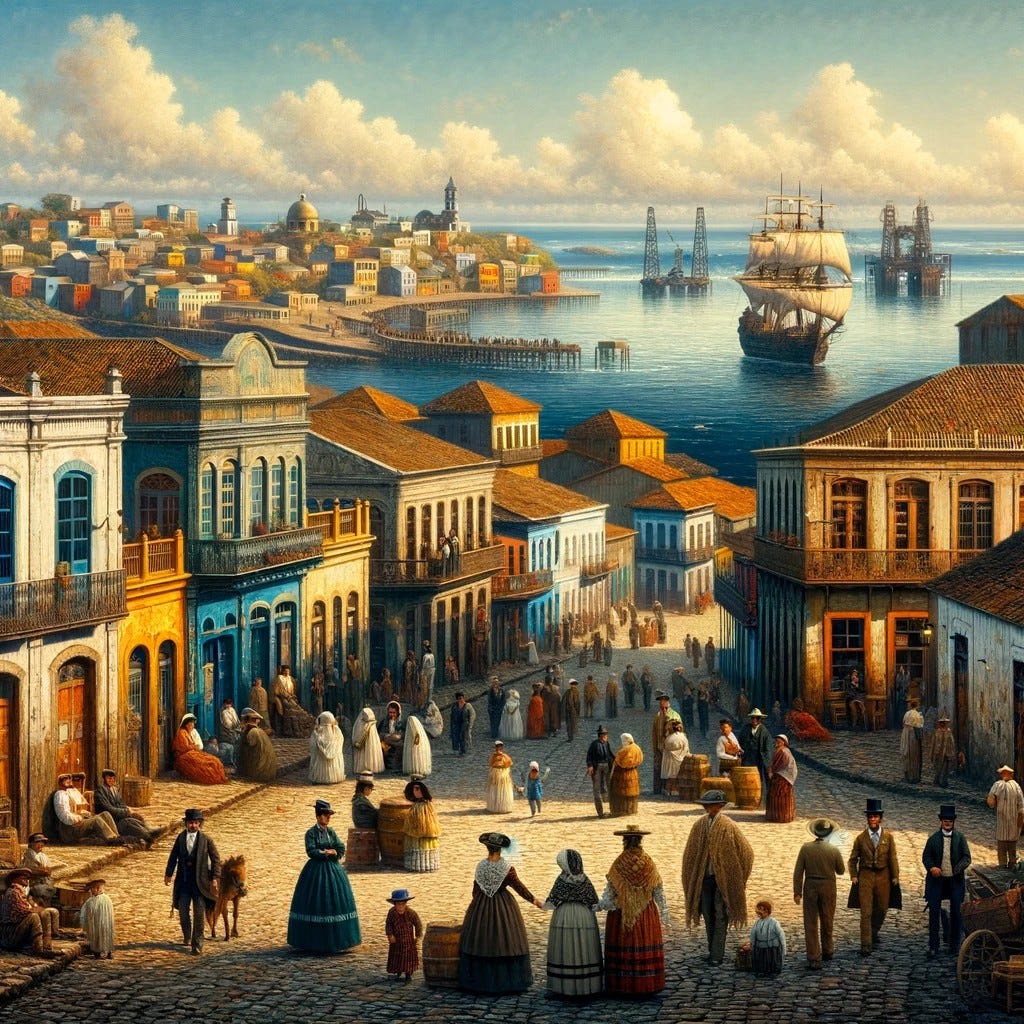A New Imperialist War for Oil Is Simmering
Venezuela is about to throw South America in disarray by claiming historical rights over Guyana's newly discovered oil reserves
Nestled on South America’s North Atlantic coast, Guyana stands as one of the only three countries in the continent to have been colonized by an empire other than the Spanish or the Portuguese. A British colony and the only English-speaking country in the continent, Guyana is wedged between Venezuela and Brazil to the west, and Suriname, a former Dutch colony, to the east (go further east and you’ll end up in French Guiana, a modern-day French colony.)
With a population smaller than 800,00 and rainforests covering almost 90% of its territory, Guyana is one of the most impoverished and least developed economies in the Western Hemisphere, and a very minor player in the world stage.
All of that is about to change in a historical instant.
This tiny nation is on track to become one of the world’s top offshore oil producers in just a few years, as it smashes record after record of stunning economic growth. West of the border, neighbor Venezuela took notice: it re-ignited a centuries-old territorial dispute and could move to invade and annex the oil rich region of Essequibo, which makes up 60% of Guyana’s territory. Quickly finding itself in the middle of this regional dispute, Brazil is treading a fine line between its support of Venezuelan ruler Nicolás Maduro, a desire to keep peace and stability in the continent, and a newfound love for oil exploration, all the while attempting to promote its climate credentials at COP28.
Oil exploration could bring wealth to a poor country
Starting in 2015, Exxon Mobil and others have made several discoveries of large new petroleum reserves in Guyana, most of them off the coast of Essequibo. A series of new findings earlier this year brought total reserves to 11 billion barrels. That would place Guyana’s reserves as one of the largest in the world, and the highest per capita of any country. It is enough oil to add approximately 5Gt of additional CO2 to the atmosphere, or nearly 10% of current annual emissions (although it would be emitted over several decades.)
Climate impact aside, the new oil reserves have already started to attract eye-watering sums of money to the impoverished country. Guyana is accelerating investment in new roads, airports, hydroelectric dams, and other infrastructure. GDP grew 62% last year and is on track to grow by another 38% in 2023, with a forecast that it should expand by more than 100% over the next five years. It is far and away the fastest growing economy in the world today.

I wish I could include Venezuela in the above chart, but since 2015 the government has been less than straightforward about the state of the economy, so the data is difficult to find. The best indication I have is that the economy was in free fall for seven consecutive years and the administration has only recently been proud to announce results once again, a sign that economic growth has finally returned to Venezuela after nearly a decade.
These new reserves are further evidence of two things:
The world will never run out of oil; current worldwide reserve stand at 1.6 trillion barrels and, despite rates of consumption still rising, we keep finding more of the stuff each year;
In spite of net-zero goals, there is still a lot of money to be made from fossil fuels, and that will remain true for a very long time. Without expectations of a healthy oil market several decades into the future, companies would not be investing huge sums, and wannabe dictators would not be risking their name in history for this commodity.
At the same time, who could deny the Guyanese this opportunity? Impoverished by centuries of exploitative colonial rule and neglected by a corrupt ruling class, they could find in oil a golden ticket to prosperity. If they can profit from it in a way that creates wealth for all its people, Guyana could ensure a good life for its citizens many generations into the future.
If it needs to see an example of what not to do, Guyana has to look no further than to its current bully: Venezuela was once one of Latin America’s wealthiest countries during a long period of high oil prices. But it has long suffered from crippling wealth inequality and, in the 1990s, descended into a deep economic and political collapse together with severe sanctions that seemingly no amount of oil can fix.
Another thing these new reserves of syrupy black gold did was to prompt Venezuela to bring to the fore once again historical claims that this oil, and the territory it comes from, don’t belong to Guyana at all.
More Oil, More Problems
Even though Essequibo has been under Guyanese control for more than a century, Venezuela has for decades claimed the region should be one of its states.
In 2006, then president Hugo Chavez added an eighth star to the country’s flag to represent the province of Essequibo. (Another, more subtle change to the flag’s coat of arms turned the white horse around to have it trotting decisively leftwards; Chavez deemed the previous horse ‘imperialist’ because it ran to the right, even while it looked to the left — it is never a reassuring sign when the ruling party decides to enshrine its own ideological preferences in the national symbol.)
The dispute for Essequibo dates back to the 19th century, when an international arbitration tribunal sided with the United Kingdom in its claim to retaining the region as integral part of British Guyana, a decision that was grudgingly accepted by Venezuela. The dispute continued after Guyana’s independence in 1966, and Venezuela’s nationalist-populist government has been ramping up the rhetoric since Chavez came to power in the late 1990s.
Last week, the International Court of Justice in The Hague ruled once again in favor of Guyana, telling Venezuela in no uncertain terms that it is not to take any steps to change the status quo.
Venezuela probably does have a tenuous argument to make in its claim to that piece of land, in a strict reading of territorial demarcations at the end of Spanish rule in the 1700s. However, that disregards centuries of history during which Essequibo has belonged to Guyana, during and after British rule. By all accounts, the people of Essequibo do not want to be part of Venezuela and appear puzzled as to why this whole thing is even happening.
On Sunday 3 December 2023, Venezuelans went to the polls in a referendum to decide whether its government should just claim sovereignty over Essequibo. As I write this, voting is still underway, but mark my words: the results will be overwhelmingly in favor of Maduro’s claim. No special powers are required for this prediction; it’s enough to simply get familiar with the history of the dispute, have followed enough similar votes in other pseudo-democracies, and read how the five questions are worded, to gain powers of divination in the matter.
It appears that the referendum is being run by the Maduro government as a test of its electoral machinery ahead of next year’s elections. It might also be an attempt to gauge the level of popular support that it currently has, which could dictate whether it will ban the main opposition candidate from running, despite the promise of free elections it agreed to in a deal with the U.S. in return for the lifting of sanctions on Venezuela.
Given the geopolitical trouble that Venezuela would bring upon itself were it to invade, an annexation is exceedingly unlikely. If a war over Essequibo does take place, it would be the first significant military conflict in South America since the war for the Falklands in 1982 (itself spurred by the impulses of another authoritarian regime facing popular backlash.) An invasion would have a predictable result: barring interference from the U.S., UK, Brazil, or another international power, Venezuela could walk in and plant a flag within its neighbor’s territory wherever and whenever it felt like; Guyana has no military to speak of, or at least not one able to stop an invasion.
And the world would then be dealing with another imperialist war for oil.
Meanwhile, in Brazil…
As Latin America’s largest economy and most important geopolitical actor, Brazil has a key role to play. Brazil shares a border with every country in South America apart from Ecuador and Chile, and has historically been a mediator in such situations. Brazilian President Lula is friendly with Maduro, who wouldn’t be able to take drastic action without at least getting Brazil to look the other way. Furthermore, the border between Venezuela and Guyana is almost entirely dense jungle, so it would be impractical for Venezuela to invade unless its forces could pass through Brazilian territory.
And Brazil is indeed paying attention, as it also has oil on its sights. Like Guyana and Venezuela, Brazil also has plans for exploring its North Atlantic coast for oil from newly discovered reserves. After making a strong commitment in last year’s COP27 hot on the heels of winning a historical election, this year Lula was seen making friends with Opec while championing credentials on climate action at COP28.
I was excited and hopeful about last year’s election results in my home country, and overall I still am. The Lula administration has once again swiftly reduced deforestation, after years of disregard for the Amazon, the country’s most valuable treasure. The clean energy transition is increasingly part of a more forward-looking national conversation. After the change in government, I had been looking forward to learning and writing more about Brazil’s strategy for a clean energy future, but thus far such plans have not been forthcoming. I’ll report back when (if) I have more!
Climate change aside, this skirmish around Brazil’s borders presents the Lula administration with an opportunity. A rebuke of its autocratic friend’s expansionist tendencies would send a signal that Brazil truly values democracy and the rule of law in South America, and not only when convenient to further its own domestic political goals.
Drill into it
Good explainer here:






